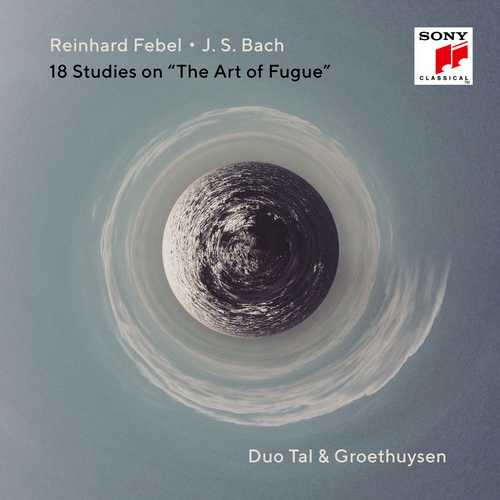
Composer: Reinhard Febel, Johann Sebastian Bach
Performer: Yaara Tal, Andreas Groethuysen
Audio CD
Number of Discs: 1
Format: FLAC (tracks)
Label: Sony
Size: 833 MB
Recovery: +3%
Scan: yes
Studies for 2 Pianos on “The Art of Fugue”, BWV 1080
01. Studie 1: Nicht zu langsam (Contrapunctus 1)
02. Studie 2: Sehr schnell (Contrapunctus 2)
03. Studie 3: Leicht schwebend, nicht zu langsam (Contrapunctus 3)
04. Studie 4: Nicht zu langsam (Contrapunctus 4)
05. Studie 5: Langsam (Contrapunctus 5)
06. Studie 6: Langsam (Contrapunctus 6 per Diminutionem in Stylo Francese)
07. Studie 7: Nicht zu schnell (Contrapunctus 7 per Augmentationem et Diminutionem)
08. Studie 8: Nicht zu langsam (Contrapunctus 8)
09. Studie 9: Sehr schnell (Contrapunctus 9 alla Duodecima)
10. Studie 10: Schnell (Contrapunctus 10 alla Decima)
11. Studie 11: Prestissimo possibile (Contrapunctus 11)
12. Studie 12: Langsam (Contrapunctus 12 Rectus+Inversus)
13. Studie 12a: Nicht zu langsam (Contrapunctus 12 Rectus+Inversus)
14. Studie 13: Prestissimo possibile (Contrapunctus 13 Rectus+Inversus)
15. Studie 13a: Schnell (Contrapunctus 13 Rectus+Inversus)
16. Studie 14: Nicht zu langsam (Canon in Hypodiatesseron per Augmentationem in Contrario Motu)
17. Studie 15: Schnell (Canon in Hypodiapason – Canon alla Ottava)
18. Studie 16: Nicht zu schnell (Canon alla Decima. Contrapunto alla Terza)
19. Studie 17: Presto feroce (Canon alla Duodecima in Contrapunto alla Quinta)
20. Studie 18: Maestoso, ma molto calmo (Fuga a 3 (4) Soggetti)
With its fourteen fugues and four canons, all of which are derived from the same thematic germ cell, J. S. Bach’s “The Art of Fugue” contains within it a veritable cornucopia of constructional variants. In his own Studies, Reinhard Febel takes apart the constituent elements of Bach’s work and reassembles them in completely new ways, occasionally opening up the musical material and allowing it to range over the entire keyboard. With their refined and extremely complex “manipulations”, these Studies produce a brilliant and occasionally even dramatically expressive undertow. They were commissioned by the Duo Tal & Groethuysen, who have now recorded them for the present world-premiere release. In composing the fugues and canons that make up “The Art of Fugue”, Bach was presumably thinking of the sound world of a keyboard instrument, although he never specified this unambiguously. As a result, this has legitimized a whole range of disparate versions for different combinations of instruments. Yaara Tal and Andreas Groethuysen – both of them well known as outstanding pianists – were drawn to the idea of interpreting the work as a piano duet. The term “study” stresses the idea of exploring and experimenting with different compositional possibilities and in that way finds its counterpart in Bach’s conception of the word “contrapunctus”. The Art of Fugue was not primarily intended for performance but was designed as a compendium of the possibilities of contrapuntal composition at a time when the golden age of this art already lay in the past. Yet Alban Berg was only one of many commentators to observe that a work regarded by many as based on pure mathematics has a uniquely profound musical depth to it. Bach maintains an impressive balance between academically abstract composition and the art of sensual expression. And the same is true for Febel’s Studies.



